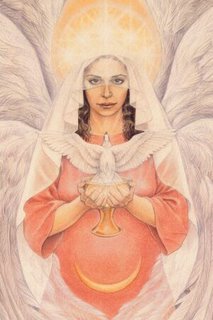Ante Diem XVII Kalendas January

Modern Date : December 16th
Ante Diem XVII Kalendas January
Seventeenth Day to the Kalends of January
This is one of the dies comitiales when committees of citizens could vote on political or criminal matters.
Feast of Sapienta
The goddess of wisdom, Sapienta or Sophia, was honored with a feast today before the beginning of Saturnalia. Sophia, or Hohkma or Sapienta etc... is the primary female figure of Judeo-Christianity, She was once very important, but because of the efforts of men who had a very serious problem with the female force in nature and themselves She has all but been exsponged from modern Bibles. She was the veiled holy spirit of wisdom, pregnant with knowledge and inviting us to drink deeply from Her cup. Old Jewish literature tells of Her role as God's co-creator, "She reaches out from one end of the earth to the other with full strength and orders all things well...Herself unchanging, she makes all things anew." without Her God is powerless. She shares God's throne, and is his creative breath. The Shakers recognized her in the rhyme: "Wisdom holds the Mother's seat, and is the Father's helper-meet." The Christian "Holy Spirit" is Sapienta, the female aspect of God.
Decima, the middle Fate in charge of the present, presides over December, but the month may have received its name as the tenth month of the Roman calendar. Vesta, patroness of fire also laid claim to the month of December.
Venus in Aquarius
On this day Venus exits the sign of Capricorn and enters the more hospitable air sign of Aquarius for a very brief visit. Venus "goes retrograde" on the 24th, and will move back into Capricorn on New Year's day. She will re-enter Aquarius on March 6.
Las Posadas
In the Roman Catholic calendar, the year's most efficacious novena--that is, nine-day prayer cycle--begins now on the ninth day before Christmas. This novena, also called Las Posadas in Hispanic countries, commemorates the journey of the Virgin Mary and St. Joseph toward Jerusalem for the birth of Jesus.
In Mexico during the nine nights before Christmas, children re-enact the drama of Mary and Joseph searching for room at the inn. They dress up and process from house to house, looking for shelter (Las Posadas means inn or shelter). One child, dressed as an angel heads the procession, followed by two people dressed as Mary and Joseph (or carrying statues of Mary and Joseph) followed by others carrying lighted candles. At each home they come to, they sing a vilancicos, a medieval Spanish carol, which features improvised lines by the members of the group. "En nombre del ciel," they beg ("in heaven's name") but the reply is always "Marchad a otra parte, y buena venture" ("move on elsewhere and good luck") until they read a house where one family sings "Pase la escogida" ("Let the chosen one enter").
Once inside they place their lighted candles around the nacimiento (nativity scene) and say a prayer and a blessing for their generous hosts. Then it's time for a party featuring fruit, hot punch, bunelos (pastries) and sometimes tamales or pozole (a thick stewlike dish).
In some parts of Mexico a pinata is broken on each of the nine nights of Las Posadas. In other places, it is broken only on Christmas Eve. The pinata, made of paper mache applied over a clay pot, is filled with treats including nuts, fresh limes, sugar canes and small green fruits.
Pastorelas, or shepherd's plays, are also performed during this time period. These plays were introduced by Franciscan friars. A group of shepherds start towards Bethlehem, but are tempted by devils. Angels rush in to rescue the shepherds and drive off the devils. These plays feature singing, dancing and satire, much like the medieval English mummer's plays which were often performed during the winter holidays.
Moon Overhead
On the fifteenth day of the eleventh Chinese lunation, shadows look extremely short. Small boys and girls wait until the moon is overhead and then look at the odd shapes cast by shadows.

